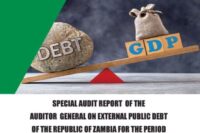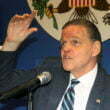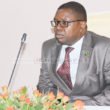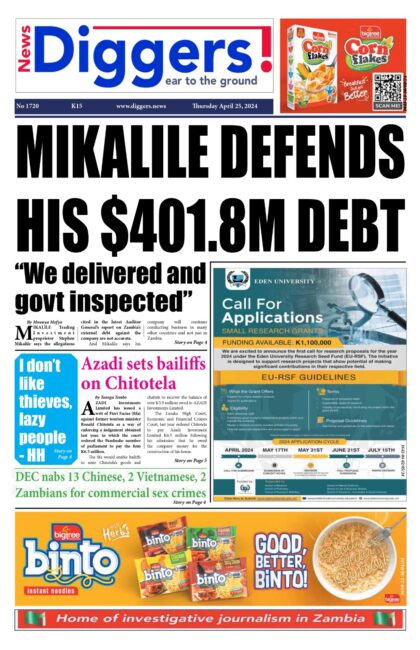The United State government’s assistance levels to Zambia may be negatively affected if that country does not deploy a new American Ambassador to replace recalled diplomat Daniel Foote, says former Special Assistant to the President for Policy Implementation and Monitoring Jack Kalala.
But Foreign Affairs Minister Joe Malanji says there is a long process that needs to be considered before the US State Department would deploy Ambassador Foote’s replacement to Lusaka.
Last December, the Zambian government wrote a demarche to their American counterparts, expressing concern over recalled Ambassador Foote’s views on the jailing of two men of Kapiri Mposhi to 15 years for practicing gay sex.
Ambassador Foote’s comments on the jailing of the two men were, however, made to contrast the handling of corruption cases in Zambian courts that had seen perpetrators walk scot-free without any punishment.
Commenting on the delayed response by the US government to announce Ambassador Foote’s replacement, Kalala observed that US-Zambia bilateral assistance would potentially be jeopardized the longer the United States did not have an official representative as an American Ambassadors lobbied for assistance to help the host country.
“They (American Embassy) have representatives; they have the deputy Ambassador and other staff and with them; they agree in advance, it is in their budget what aid to give to the Zambian government. In a way, it may have an effect because what happens is that, if the sending government wants to do anything for that country, they ask the Ambassador to give them his reviews, so he reports back to the government. And, sometimes, the Ambassadors lobby for the host government to say, ‘in this country, there is need for this aid.’ Now, if you don’t have an Ambassador for that country, it becomes a bit tricky to get assistance from that particular State because there is no one to do the lobbying,” Kalala explained.
“And, sometimes, the host government would go through the Ambassador to make certain requests. The officers that remain operating in that (US) Embassy are sent by respective departments; they are not sent by the President, they are not representatives of the President so they cannot lobby for the host government because they have specific duties that they do in that particular country. But an Ambassador is a goal between the host government and the sending government so assistance may be affected.”
He lamented that the US government recalled Ambassador Foote because his life was under threat in Zambia, not because there was a demand from President Edgar Lungu’s government.
“The American government may assess the situation whether they think it is convenient or safe for them to send another Ambassador here because the recall of Ambassador Foote was a result of the conflict that was between the government and the Ambassador. And especially that the Ambassador was threatened that is why they recalled him. It is not compliance with the demand that the Zambian government made, no! In my view, it is as the result of threats that were made on the Ambassador by the party cadres. In view of what happened in Libya, I am sure the American government is being cautious if it is safe to send an Ambassador here. So, they may be considering those issues and that is why they quickly recalled him because they did not want a repeat of what happened in Libya to happen in Zambia,” Kalala explained.
In September, 2012, Islamist militants armed with anti-aircraft weapons and rocket-propelled grenades stormed a lightly-defended United States diplomatic mission in Benghazi, Libya, killing American Ambassador, John Christopher Stevens, and three members of his staff at the height of the Arab Spring that swept away dictatorial regimes, which included fallen Libyan leader Muammar Gaddafi.
It was the first time a US diplomat had died in a violent assault since 1979.
“When an Ambassador speaks, what he says has to be approved by the State Department in the case of America so it was approved; they knew that the Ambassador (Foote) was going to say here so they would not recall him on the basis of that. And it is not the first time that foreign Ambassadors in Zambia have spoken out; those from donor countries have criticized government; in all these past governments they have been speaking out because they consider themselves as stakeholders; they donate a lot of money to African countries not only in Zambia. So, as stakeholders they think that they have a right to speak out and to ensure that the money they give to the government is put to proper use,” said Kalala.
Meanwhile, Malanji explained that there was a long process that needed to be considered before the US State Department would deploy Ambassador Foote’s replacement to Lusaka.
He also argued that it was premature to notify the media about what was going on.
“You know, this is not a programme, which (is) like selling salt, it is a long process. And I think it will be premature now. These are diplomatic matters and every sentence I cannot be coming to the media, we don’t operate like that. At an appropriate time when we want to talk to the media, we will call you,” said Malanji in a brief interview in Lusaka.













One Response
The sentence could be considered too harsh, judging even by conservative Islamic traditions such as Algeria. Article 338 of Algerian law (English translation) reads:
Anyone guilty of a homosexual act is punishable with imprisonment of between 2 months and two years, and with a fine of 500 to 2000 Algerian Dinars. If one of the participants is below 18 years old, the punishment for the older person can be raised to 3 years’ imprisonment and a fine of 10,000 dinars
While the country prepares for imminent law reforms, the suspended sentence would be a more considered response to an ever changing legal jurisprudence of contemporary society, Personal or tribal standards need not substitute national laws. Dialogue must not be forbidden. The price is higher where dialogue and dissenting views is suppressed by a tiny clique of fanatics.